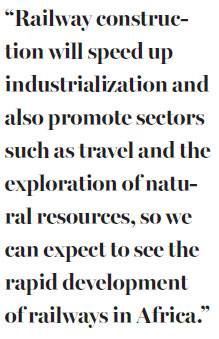Opportunities abound in infrastructure

Chinese companies can benefit from major projects in Africa, provided they proceed with caution and minimize potential risk
African infrastructure construction has offered big opportunities for Chinese engineering companies as the continent gears up for industrialization. In recent years, more opportunities have arisen which are worth the attention of the Chinese government and companies.
First on the list is the construction of electricity facilities, followed by railways, commercial buildings and industrial infrastructure.
Electricity supply is the most crucial factor for the development of the continent, as it is fundamental for industrialization.

Compared with other forms of transport, railways have the advantages of larger freight volume, lower costs and wider network coverage. Railway construction will speed up industrialization and promote such sectors as travel and the exploration of natural resources, so we can expect to see the rapid development of railways in Africa.
Population growth and urbanization will require the construction of commercial and industrial infrastructure for work, shopping and entertainment, as well as the creation of facilities such as ports, harbors and industrial zones.
Second, the exploration and development of renewable energy resources is important. Most African countries have so far depended on imported petroleum to generate electricity. That has not only caused environmental pollution, but also wasted precious foreign exchange. Fluctuations in international oil prices have a big effect on African economies.
In the face of challenges caused by climate change and in a bid to solve problems caused by energy shortages, many African countries are encouraging the exploration of renewable energy resources. Namibia, in southern Africa, has prepared a draft policy document which includes a number of possible scenarios regarding the sharing of renewable energy.
Third, transnational and transregional infrastructure projects will be promoted in Africa as integration becomes popular and accepted by more nations. Projects such as the Lamu Port Southern Sudan-Ethiopia Transport Corridor, which links South Sudan, Ethiopia and Kenya; the Northern Corridor Integration Project, which links Rwanda, Uganda and Kenya; and the 22 infrastructure projects of the central transport corridor are all under construction.
Fourth, privatization is accelerating and public and private partnerships have become popular in Africa. More African countries, including Nigeria and Morocco, have started to implement privatization and are using public and private partnerships to raise funds for infrastructure construction.

Fifth, the tendering process for projects is becoming more transparent and better quality is being demanded. The Kenyan government launched an electronic bidding system last year and all project bids will be registered online. South Africa, Botswana and Zambia have instigated anti-monopoly investigations and are trying to increase the transparency of bidding for projects. Some countries, such as Namibia, require contractors to use local products and suppliers in government-supported projects, showing a willingness to promote localization.
Sixth, unstable tax policies and the risk of defaults remain at a high level. The economies of many African countries' have been badly affected by plummeting commodity prices since 2014. Some projects may be interrupted because payments cannot be made in time. Contractors may also suffer losses as governments increase taxes during the construction process.
In the face of these trends, the Chinese government should take full advantage of the infrastructure construction cooperation system and strengthen its cooperation with international and regional institutions such as the African Union. It can also set up specific funds for infrastructure construction cooperation in Africa, aimed at improving the ability of African countries' to make and implement plans. This will give schemes more stability.
In addition, the government should encourage companies to focus on projects for the development and construction of industrial parks, mineral resource exploration and information service platforms. It should also encourage Chinese engineering companies in Africa to form joint ventures, educate and train talent, share information and strengthen cooperation on security together. The formation of security and defense companies should also be encouraged.
To control risk, we suggest Chinese engineering enterprises carry out risk assessment before entering the African market. Corruption, economic problems and social conflicts can all cause big risks. Enterprises should have a team that focuses on studying local laws and political policies, formulating a risk prevention scenario. Chinese enterprises should also try to develop local industrial chains which have a close relationship with their main projects, such as factories producing steel, gates and windows.
Chinese enterprises can also take out overseas investment insurance from the China Export and Credit Insurance Corporation. This can provide an effective protection against contract defaults for political reasons.
In addition, during the construction process, Chinese enterprises should avoid losses caused by payment default. They should ensure the payment is paid in accordance with the project schedule.
Finally, Chinese enterprises should implement localization strategies, protect the local environment and try to fulfill social responsibilities well. Regular communication with local governments, political institutions and residential communities can help reduce misunderstandings between Chinese companies and local people, and create a win-win situation.
The author is head of the Center for African Economics Studies at Zhejiang Normal
University's Institute of African Studies.
(China Daily Africa Weekly 01/20/2017 page10)
Today's Top News
- Evidence mounts of Japan's wartime atrocities
- Gunmen kill 11, wound many on Sydney beach
- Study finds Earth's deep water reservoirs
- China remembers victims of Nanjing Massacre 88 years on
- Philippines' provocations will avail it nothing: China Daily editorial
- China steps up financial support to spur consumption






























